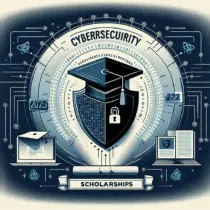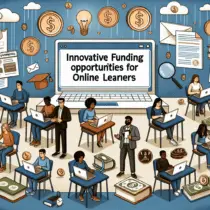Writing a scholarship essay can be a daunting task, especially when the stakes are high. Whether you are applying for the “$7,000 Music Majors Melody Bursary in Canada, 2024” or the $500 Student Advancement of Women in STEM Grant in New Zealand, 2024“, presenting a compelling essay is crucial. The good news is that with the right strategies and tips, you can craft an essay that stands out to scholarship committees. This article provides essential tips and strategies to help you write the perfect scholarship essay in 2025.
Understanding the Prompt
Your first step in writing a winning scholarship essay is understanding the essay prompt. Carefully read the instructions and make sure you know what the scholarship committee is looking for. Is it an essay that discusses your career goals, a personal experience, or a significant accomplishment? Whatever the focus, ensure you address every part of the prompt.
For example, if you are applying for the “$7,000 Music Majors Melody Bursary in Canada, 2024,” and the prompt asks you to describe your passion for music and how it has influenced your academic and personal life, ensure your essay directly answers this question.
Personalizing Your Essay
Scholarship committees want to know who you are beyond your grades and test scores. Share your unique story. Why are you passionate about your field of study? What are your career goals? What obstacles have you overcome?
For instance, if you are applying for the “$500 Student Advancement of Women in STEM Grant in New Zealand, 2024,” you might discuss the challenges and triumphs you experienced as a woman in a predominantly male field. This adds a personal touch that can make your essay more memorable.
Starting Strong
A strong introduction sets the tone for your entire essay. Start with an engaging hook that captures the reader’s attention. This could be a quote, an anecdote, or a thought-provoking question.
For example, you might begin your essay with an anecdote about the moment you realized your passion for music if applying for the Music Majors Melody Bursary. This draws the reader in and provides a personal glimpse into your life.
Structuring Your Essay
A well-structured essay is easier to read and comprehend. Typically, a scholarship essay should include an introduction, body paragraphs, and a conclusion.
- Introduction: Start with a hook, then introduce the main topic and your thesis statement.
- Body Paragraphs: Each paragraph should focus on one main idea. Use clear and concise language, and provide examples to support your points.
- Conclusion: Summarize your main points and restate your thesis. End with a call to action or a statement that leaves a lasting impression.
Showcasing Your Achievements
While humility is admirable, a scholarship essay is not the place to downplay your accomplishments. Highlight your achievements, but do so humbly and sincerely.
In the context of the “$500 Student Advancement of Women in STEM Grant,” you could discuss a successful project that showcases your skills and contributions to the field. Be specific about what you did, what you learned, and how it has prepared you for future challenges.
Demonstrating Your Need
Some scholarships, like the Music Majors Melody Bursary, may take financial need into account. If this is the case, don’t shy away from discussing your need for financial assistance. Be honest and transparent about your situation, and explain how the scholarship will help you achieve your goals.
For instance, you might explain how the $7,000 bursary will enable you to purchase necessary instruments or pay for tuition and other education-related expenses, which can relieve financial stress and allow you to focus on your studies.
Proofreading and Editing
Spelling, grammar, and punctuation errors can detract from your message and make your essay seem less professional. Before submitting your essay, take the time to proofread and edit carefully.
Consider asking a teacher, mentor, or friend to review your essay. Fresh eyes can catch mistakes you might have missed and provide valuable feedback on your content and structure.
Staying Within the Word Limit
Scholarship essays often come with word limits. Respecting this limit shows that you can follow instructions and convey your message concisely.
If you find your essay is too long, look for redundant or repetitive sentences to cut. If it’s too short, consider if there are relevant details or examples you can add to bolster your arguments.
Using a Clear and Concise Writing Style
Avoid using overly complex language or jargon that might confuse the reader. Scholarship committees appreciate clarity and conciseness.
Your goal is to communicate your message effectively. Simple, direct language can be just as compelling, if not more so, than elaborate prose.
Answering “Why You?”
Many scholarship essays ask why you are the ideal candidate. Take this opportunity to highlight what sets you apart.
For example, if applying for the “$500 Student Advancement of Women in STEM Grant,” you might emphasize your dedication to promoting gender equality in STEM, your academic achievements, and your long-term aspirations in the field.
Adding a Personal Touch
Your essay should reflect your personality and voice. While it’s important to maintain a professional tone, don’t be afraid to show your enthusiasm and passion for your field of study.
If you love music, let that passion shine through in your essay for the Music Majors Melody Bursary. If you’re dedicated to advancing women in STEM, convey that dedication in your application for the related grant.
Setting Yourself Apart
Scholarship committees read hundreds, if not thousands, of essays. What makes yours stand out? Consider what unique experiences, perspectives, or skills you bring to the table.
For instance, if you have a unique background or have had experiences that influenced your academic and career path, share them. These details can differentiate you from other candidates.
Researching the Scholarship
Understanding the values and goals of the organization offering the scholarship can provide insight into what they are looking for in an applicant.
If you’re applying for the Music Majors Melody Bursary, research the organization behind it. Do they value community involvement, leadership, or academic excellence? Tailor your essay to align with their values and what previous recipients have demonstrated.
Seeking Feedback
Once you have a draft, seek feedback from people you trust—teachers, mentors, or peers. They can provide constructive criticism and help you refine your essay.
Be open to suggestions, but remember that the final voice should be your own. Balance incorporating feedback with maintaining your writing style.
Practicing Persistence
Writing the perfect scholarship essay is a process that may require several drafts. Don’t be discouraged by setbacks or rejections. Each essay you write hones your skills and increases your chances of success.
Persistence is key. Continue applying for multiple scholarships and improving your essays based on feedback and your evolving understanding of what makes an excellent application.
Avoiding Common Pitfalls
Here are some common mistakes to avoid:
- Ignoring the Prompt: Make sure you answer the essay question directly and fully.
- Being Too Generic: Personalized essays are more compelling. Avoid generic statements that could apply to anyone.
- Failing to Proofread: Errors can make you seem careless. Proofreading is crucial.
- Missing the Deadline: Ensure you submit your essay on time. Late submissions are often not considered.
Conclusion
Crafting the perfect scholarship essay requires time, effort, and a strategic approach. By understanding the prompt, personalizing your essay, starting strong, structuring your content, showcasing your achievements, and demonstrating your need, you can create an essay that stands out.
Remember to proofread and edit, stay within the word limit, and use a clear writing style. Answer why you are the ideal candidate, add a personal touch, and set yourself apart. Research the scholarship, seek feedback, and practice persistence. Avoid common pitfalls and ensure you submit your essay on time.
With these tips and strategies, you can confidently approach your scholarship essays and increase your chances of securing funding for your education. Whether aiming for the “$7,000 Music Majors Melody Bursary in Canada, 2024” or the “$500 Student Advancement of Women in STEM Grant in New Zealand, 2024”, remember that a thoughtful, well-written essay can make all the difference.






